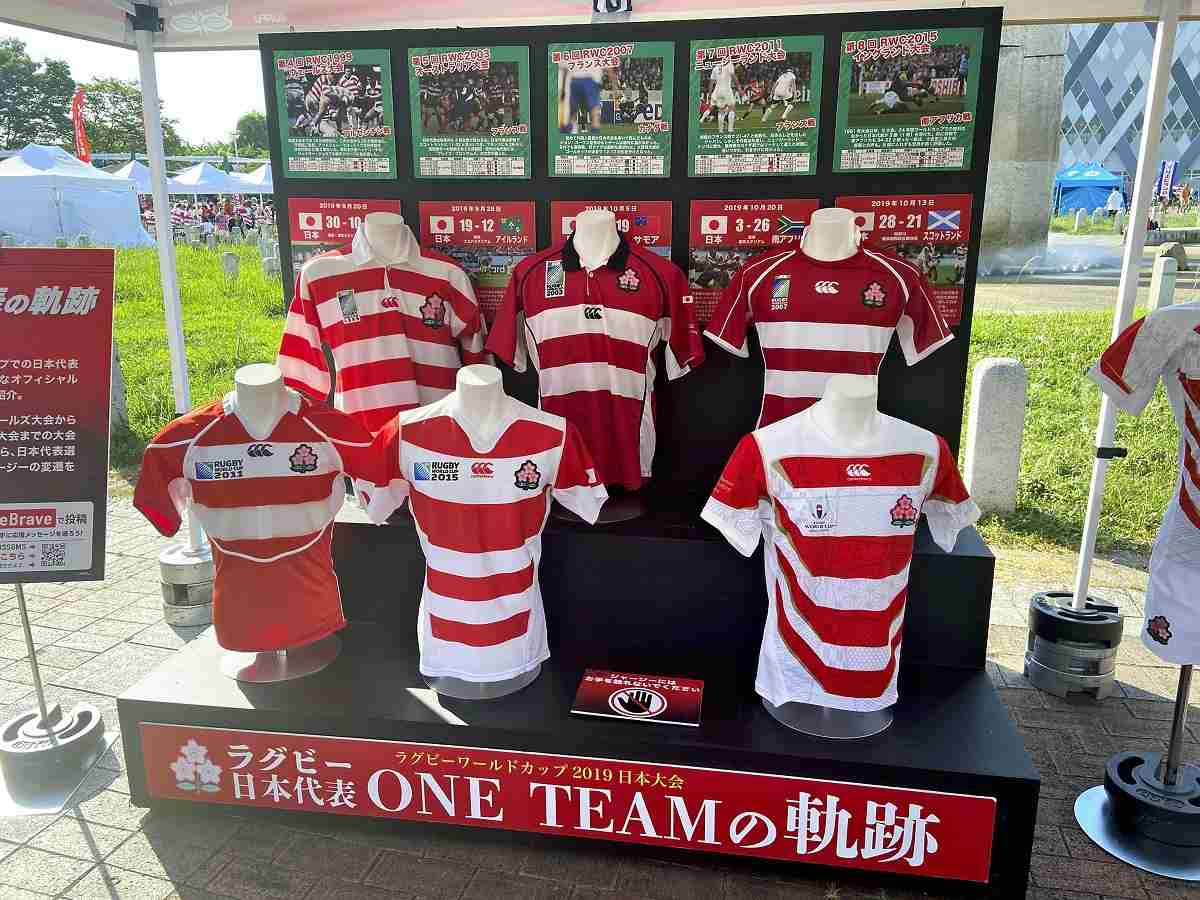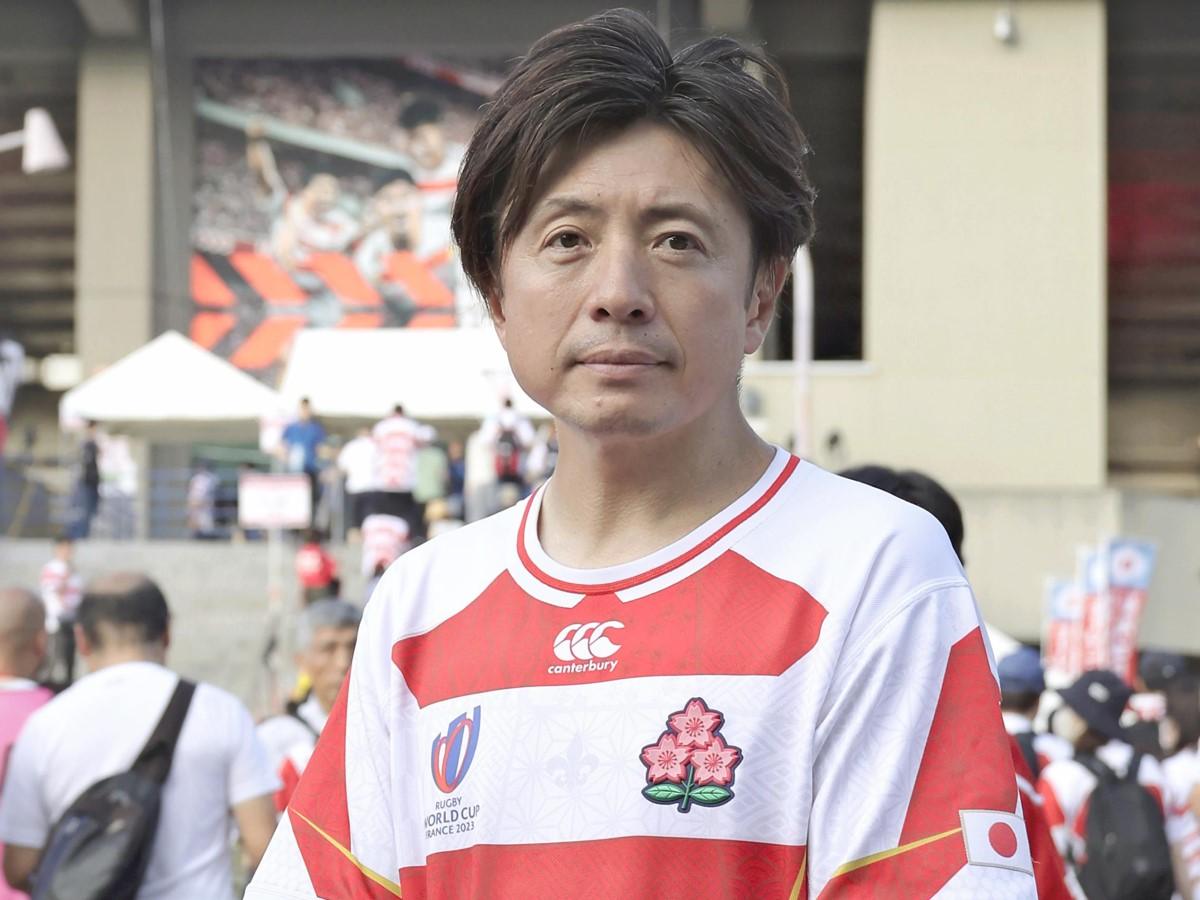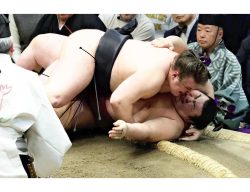
The jerseys Japan wore at previous Rugby World Cups. Back row from left: the jerseys from the 1999, 2003 and 2007 tournaments. Front row from left: those worn in 2011, 2015 and 2019.
17:28 JST, September 7, 2023
When Japan’s players take the field at the Rugby World Cup in France, the spirit of their fans back home will be right there with them in every scrum, lineout and dazzling backline move.
The jerseys to be worn by the Brave Blossoms incorporate material from old rugby uniforms donated by fans, and Masayuki Ishizuka, the director in charge of developing the shirt, hopes this will unite the players and supporters along the theme of “one team.”
The aim is for the Brave Blossoms to feel that even on the faraway fields of France, the fans will be by their side, and inspire them to a historic showing by reaching the semifinals – or even the final – for the first time.
At the last Rugby World Cup in 2019, Japan pulled off a massive shock by defeating world No. 2 Ireland in a group-stage game at Ecopa Stadium in Shizuoka Prefecture. Ishizuka was in the stands that September day, and remembers well the tears of joy flowing down his cheeks after the final whistle.
The players hugging each other with delight were wearing jerseys that Ishizuka had developed, and the stadium was a sea of fans clad in replicas of the red and white shirts.
“My meticulous attention to detail in my job paid off,” recalled Ishizuka, 50, who had been involved in developing rugby jerseys since the 2003 World Cup. “I was moved by the sight of the entire stadium being united as one.”
Ahead of that first Rugby World Cup on Japanese soil, Tokyo-based sports apparel manufacturer Goldwin Inc. prepared three jerseys with different materials and construction tailored to the specific needs of each position. The players and the Japan Rugby Football Union hailed the jerseys as the “best ever.”
The jerseys played their role as Japan made it to the last eight for the first time in its history.

Masayuki Ishizuka, the director in charge of developing jerseys for Japan’s national rugby team, wears the newest one at Prince Chichibu Memorial Rugby Stadium in Tokyo in early August.
Overcoming pandemic hurdles
In a bid to develop an even more advanced jersey for this year’s World Cup in France, Goldwin turned to “chemical recycling,” a process in which waste plastic is chemically treated and reprocessed.
The environmentally friendly technology also addresses the major social problem of huge volumes of clothing getting thrown away annually.
Planning for the new jersey began in 2020. However, the COVID-19 pandemic spread around the world that year, forcing the cancellation of matches in Japan’s domestic league and pouring cold water on the popularity that rugby had attained at the 2019 World Cup. Discrimination and mudslinging against medical workers and people who caught the virus continued unabated, causing divisions within society.
It was at this time that Ishizuka recalled the sense of unity he witnessed during the Japan-hosted World Cup. Personifying the national side’s slogan of “One team,” the players and fans became united as one, providing the impetus for the Brave Blossoms’ impressive charge through the group stage.
Ishizuka wanted the new jersey to encapsulate his desire to “overcome the pandemic and once again unite Japan.” He decided the best way was to collect beloved rugby uniforms from fans and chemically recycle them into a material that could be used for the team’s World Cup jerseys. A campaign seeking donations of rugby clothing made from 100% polyester drew 1,266 items.
Kayoko Teraoka, a 55-year-old temp worker from Edogawa Ward, Tokyo, donated a T-shirt her late husband, who died five years ago, wore when he ran in and finished a full marathon.
Teraoka had never been a rugby fan until she watched some games during the 2019 tournament and got hooked. “Rugby added color to my life,” Teraoka said. “I hope the players will run hard for my husband, too.”
3 years getting it right
Developing jerseys strong enough to stand up to a rough-and-tumble sport like rugby was a massive challenge. The jerseys must not only be able to withstand the punishing tackles, but be light and allow the players to move comfortably.
However, it was difficult to get the fabric made from old clothes to maintain a certain level of strength and quality.
About 60 prototype materials were made, and the process of developing the ideal material stretched out to three years. In the end, two types of jerseys were created – one for the forwards, who grapple with opponents in scrums and other parts of the game; and one for the backs, who try to get out of the grasp of would-be tacklers.
The material is about three times more durable than that used for the jerseys worn at the 2019 World Cup. As for the design, there was no change there, with stripes evoking the image of the maedate crest adorning the front of a samurai warrior’s helmet.
The players got to try on the jerseys for the first time this spring, with Ishizuka explaining the development process. Veteran loose forward Michael Leitch praised it as light and comfortable, saying he “had never worn such a good jersey.” Japan captain Kazuki Himeno told Ishizuka, “When I wear it, it gives me courage.”

Kazuki Himeno, center, and Japan teammates wear the new jersey designed for the upcoming Rugby World Cup during a game on July 15.
The World Cup kicks off Friday local time, while Japan will begin its campaign against Chile on Sunday. Ishizuka is hoping his jerseys will give the Brave Blossoms an edge.
“In rugby, the jersey is part of the strategy. I’m proud to say we’ve created the best jersey ever,” Ishizuka said. “I hope that when the players are having a tough moment during a game, they will sense the support of the fans back in Japan and it will give them strength.”
Top Articles in Sports
-

Aonishiki Tops Atamifuji in Playoff to Win New Year Grand Sumo Tournament in Ozeki Debut
-

Milano Cortina 2026: Figure Skaters Riku Miura, Ryuichi Kihara Pair Win Gold; Dramatic Comeback from 5th Place in SP
-

Milano Cortina 2026: Kokomo Murase Comes Out on Top After Overcoming Obstacles, Aiming for Greater Heights in Competition
-

Milano Cortina 2026: Riku Miura, Ryuichi Kihara Clinch Japan’s 1st Gold in Pairs Figure Skating, Rebounding from Disappointing Short Program
-

Milano Cortina 2026: Olympics-Torch Arrives in Co-Host Cortina on Anniversary of 1956 Games
JN ACCESS RANKING
-

Japan PM Takaichi’s Cabinet Resigns en Masse
-

Japan Institute to Use Domestic Commercial Optical Lattice Clock to Set Japan Standard Time
-

Israeli Ambassador to Japan Speaks about Japan’s Role in the Reconstruction of Gaza
-

Man Infected with Measles Reportedly Dined at Restaurant in Tokyo Station
-

Videos Plagiarized, Reposted with False Subtitles Claiming ‘Ryukyu Belongs to China’; Anti-China False Information Also Posted in Japan


























